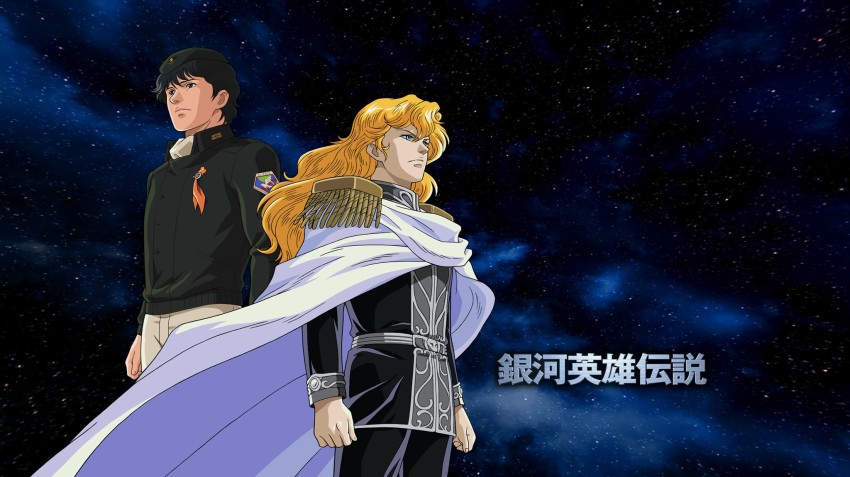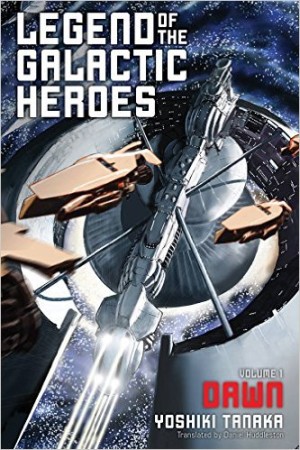Books: Legend of the Galactic Heroes
January 10, 2017 · 0 comments
By Raz Greenberg.
 Legend of the Galactic Heroes is one anime phenomenon that took its time to reach western anime fans. Starting as a long-running series of space-opera prose novels by the prolific Yoshiki Tanaka (who also wrote the equally popular Heroic Legend of Arslan fantasy series), it went through several anime adaptations – the most famous being a 110-episode video series, released between 1988 and 1997, eagerly purchased by fans who were willing to overlook such issues as crawling narrative or limited animation. High licensing costs have prevented the English-speaking anime audience from learning just what the fuss is all about for years. News of an English release of the anime surfaced a year ago, though at the time of this writing, nothing has progressed into actual release.
Legend of the Galactic Heroes is one anime phenomenon that took its time to reach western anime fans. Starting as a long-running series of space-opera prose novels by the prolific Yoshiki Tanaka (who also wrote the equally popular Heroic Legend of Arslan fantasy series), it went through several anime adaptations – the most famous being a 110-episode video series, released between 1988 and 1997, eagerly purchased by fans who were willing to overlook such issues as crawling narrative or limited animation. High licensing costs have prevented the English-speaking anime audience from learning just what the fuss is all about for years. News of an English release of the anime surfaced a year ago, though at the time of this writing, nothing has progressed into actual release.
Tanaka’s original novels, however, have been licensed by VIZ Media, with an ambitious release schedule that has seen the first three volumes in print in 2016. Reading Dawn, the first volume goes a long way in explaining the longstanding appeal of the series and its adaptations, even though this appeal is often hidden beneath many storytelling problems.
 The almost laughably-pulpy title of the series is misleading, as it implies a bigger-than life heroic story, when what readers get is more of a cynical fable about two equally-inefficient forces fighting to control the galaxy. One is the Galactic Empire, a futuristic tyrannical monarchy ruling supreme over many planets, modeled after the Germanic kingdoms of the 19th century with some unpleasant Nazi-like elements thrown in for a good measure (an obsession for Aryan-style perfection and a fetish for Nordic iconography). The other is the Free Planets Alliance, a more-or-less liberal democratic coalition of worlds fighting against the Empire’s fascism.
The almost laughably-pulpy title of the series is misleading, as it implies a bigger-than life heroic story, when what readers get is more of a cynical fable about two equally-inefficient forces fighting to control the galaxy. One is the Galactic Empire, a futuristic tyrannical monarchy ruling supreme over many planets, modeled after the Germanic kingdoms of the 19th century with some unpleasant Nazi-like elements thrown in for a good measure (an obsession for Aryan-style perfection and a fetish for Nordic iconography). The other is the Free Planets Alliance, a more-or-less liberal democratic coalition of worlds fighting against the Empire’s fascism.
As noted above, Tanaka makes no attempt to portray either side as ideal or even right: the Empire is described as a stiff traditional society, trapped in its old-fashioned hierarchy and rituals, while the Alliance is a bottomless pit of financial and political corruption. It certainly brings a certain amount of realism and interest to the novel’s setting, but eventually it didn’t really work for me – I never felt the setting that Tanaka created truly comes to life. He tries to squeeze a lot of information in Dawn – in fact, the novel opens with a prologue of almost 20 pages detailing the history of the conflict before getting to introduce the protagonists – but while readable, it often results in overlong passages that take the readers’ attention away from the plot. The futuristic setting that Tanaka has created is impressively detailed, but Tanaka often makes the mistakes of using his characters to tell its story, other than using it to tell a story about his characters.
Which is a shame, because the characters that Tanaka writes about are more interesting than the galaxy that surrounds them. Dawn follows two military commanders – Reinhard von Lohengramm of the Empire and Yang Wen-Li of the alliance – each a maverick military genius, as the plot pushes them to clash repeatedly. Lohengramm, at least when the plot of Dawn is concerned, is the more mysterious and distant figure: a brilliant strategist above and beyond the level of his superiors, of whom we learn mostly through the point of view of his close friends and bitter enemies; his quick rising through the ranks of the Empire is motivated by far more than achieving a higher status. Yang is the more down-to-Earth character, a reluctant soldier who aspires for the humble career of a military historian but finds himself again and again in command of the Alliance forces, often saving the day when all seems lost.
Dawn follows both protagonists in dual conflicts – each of them must struggle against his own superiors and against the opposite side in the war. The first kind of conflict is where Lohengramm’s character shines: Tanaka clearly enjoys describing him as a master in chess games of galactic warfare. The second kind is where Yang’s character gets the spotlight: his views on survival in the cutthroat-politics reality he lives in reveals that underneath his cynical façade there is actually something of a romantic figure.
This strength in telling the story of both protagonist holds Dawn together, despite the novel’s aforementioned problems. Will it be enough to make me pick up the following volumes? I’m not sure. The novel’s attempt to hint at its end of bigger things to come didn’t work very well. But if you want to discover just what the fuss surrounding Legend of the Galactic Heroes is all about, than reading Dawn – at least until an English release of the anime is out – is a good place to start.
Legend of the Galactic Heroes: Dawn is out now from VIZ Media.
Leave a Reply